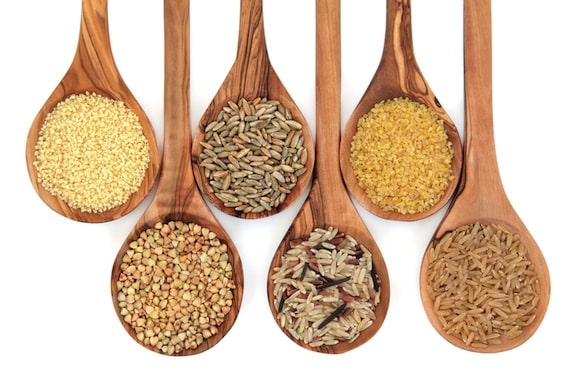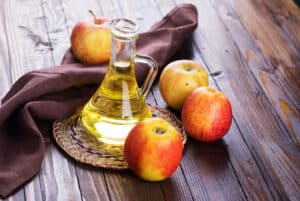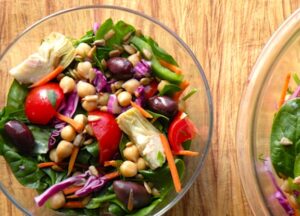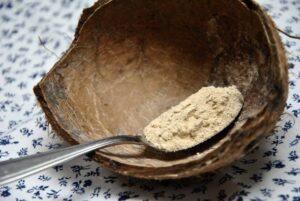Getting enough iron in a vegan diet — AKA plant-based — shouldn't be difficult if you know what foods are rich in this essential nutrient. A vegan diet relies mainly on the consumption of breads, cereals, grains, fruits, vegetables, legumes, nuts, and seeds to obtain adequate nutrition — including iron.
Iron is an essential mineral and is a component of hemoglobin, the pigment in blood that carries oxygen throughout the body. The recommended daily intake of iron varies by age and gender, 18 mg in women 19-50 years, 8 mg in men 19-50 years, and 8 mg in all adults over 50 years.
Avoiding iron deficiency
Iron deficiency anemia is a common disorder, especially in women, and is associated with fatigue, weakness, lightheadedness and shortness of breath. Low iron levels do not uniformly cause these symptoms, but do increase the risk for anemia and the risk of becoming symptomatic during periods of emotional or physical stress.
Although it is commonly reported that iron intake is similar among vegans, vegetarians, and omnivores, daily iron intake is a relatively useless term because it provides no information about the amount of available iron to the body for absorption.Vegan diets contain only non-heme iron. The challenge for vegans is to consume adequate amounts of iron in a form that can be utilized efficiently.
In fact, the bioavailability of iron can vary up to 10-fold in the same foods, depending on the other foods that are eaten with the meal (Hallberg 2000). Although the iron content of vegan meals may be similar to non-vegan meals, there will likely be less iron available for absorption in the vegan meal because of chemical differences inherent to the iron found in these non-meat sources.
Heme vs. non-heme iron
Animal products are a viable source of iron and they contain a form of iron, heme iron, that is purported to be more readily utilized in the body than non-heme iron. In fact, around 15-35% of heme iron is utilized by the body versus only 2-20% for non-heme iron.
However, animal foods are also rich sources of other unwanted products such as calories, fat, saturated fat, cholesterol, hormones, pesticides, and antibiotics, all of which increase your risk for chronic disease and lower your immune defenses. Another problem, heme iron is associated with a huge increase in colon cancer. The vegan lifestyle, on the other hand, is associated with lower rates of obesity, heart disease, cancer, diabetes and even gallstones (Ball 1999).
Still at risk
One adaptation that the body will make to chronically low iron stores is that it will use less iron. Therefore, some of the disadvantages of lower iron absorption in vegans are offset by the body limiting the use of iron. Yet vegetarians and especially vegans still remain at high risk for iron deficiency. Almost half of female vegans are iron deficient (Waldmann 2004).
Vegan should be aware of the best dietary sources of iron and regularly incorporate them into the diet. Some of the best vegan sources of iron are listed below, along with the amount of iron (mg) found in each serving.
Iron-Rich Plant-Based Foods
Keep in mind that the following vitamin rich foods can be used in juicing recipes for a glass of the best liquid vitamins ever.
- Breads, Cereals, and Grains
- Cream of wheat, 10
- Bran flakes, 8
- Quinoa, 4
- Oatmeal, 2
- Fruits
- Prune juice, 3
- Dried apricots, 2
- Dried figs, 2
- Raisins, 2
- Vegetables
- Cooked spinach, 6
- Cooked mushrooms, 3
- Baked potato, 2
- Legumes
- Soybeans, 9
- Tofu, 7
- Lentils, 7
- Beans (kidney, lima, pinto), 4-5
- Nuts and Seeds
- Sunflower seeds, 2
- Cashews, 2
Enhancing iron bioavailability
There are also some strategies that can be used to enhance iron bioavailability. Eating foods with high levels of vitamin C can enhance the availability of non-heme iron up to six-fold. So eating fruits and vegetables along with the high iron foods named in the list will enhance the absorption of iron.
Foods such as broccoli, potatoes, chard, and other greens are especially good choices because they contain high levels of both iron and Vitamin C. Coffee, phytates found in cereal and legumes, and soy protein may hinder iron absorption and should be limited when high iron foods are consumed.
Are supplements necessary?
Some experts have argued that iron supplements may be necessary for the vegan female in order to attain adequate iron levels. However, this is not necessary if the guidelines above are adhered to. Furthermore, iron supplements are not without risk and may cause gastrointestinal side effects or iron overload. Iron overload results when excess iron is found in the circulation and gets deposited in the heart and liver. Iron overload is often not diagnosed until irreparable damage has been done.
Attainment of iron from vegan dietary sources is much safer than supplements. Generally, vegans can attain adequate iron levels and maintain sufficient stores in the body if they consume a wide variety of iron-rich foods and time the intake of these foods around consumption of other foods that enhance, not limit, iron absorption.
- For more tips on plant-based nutrition, make sure to browse VegKitchen’s Nutrition page.
- For lots more features on healthy lifestyle, please explore VegKitchen’s Healthy Vegan Kitchen page.
References
- Ball MJ, Bartlett MA. Dietary intake and iron status of Australian vegetarian en. Am J Clin Nutr. 1999 Sep;70(3):353-8.
- Hallberg L, Hulthén L. Prediction of dietary iron absorption: an algorithm for calculating absorption and bioavailability of dietary iron. Am J Clin Nutr 2000;71:1147–60.
- Waldmann A, Koschizke JW, Leitzmann C, Hahn A. Dietary iron intake and iron status of German female vegans: results of the German vegan study. Ann Nutr Metab. 2004;48(2):103-8. Epub 2004 Feb 25.
Dr Linda Kennedy MS SLP ND: Is an avid animal activist and nature lover. She owns a 10,000 square foot state of the art nutritional laboratory where she produces nutritional health supplements that are free of animal products.







sina says
I didn't catch one point and it's what i'm looking for all over the web. what about heme iron? it's not available in vegetable foods and it's making hemogolobins. how a vegan can get enough supply of that?
Nava says
Hi Sina, I personally don't know much about this, however, after being vegan for quite a long time, my iron levels seem to be fine. Here is an article from The Vegetarian Resource Group that addresses the issue of heme versus non-heme iron: http://www.vrg.org/nutrition/iron.htm
sina says
I already read the article. It has a good table of iron rich vegetables. The problem is nobody say if heme iron used for making hemoglobins then what's the use of non-heme iron. I came to conclusion that the problem with non-heme iron is its digestion which as you and vrg.org suggested it can be easily solved by Vitamin C.
Thanks for helping me anyway. I'm new to vegetarianism and to make a thorough decision, I should be clear about all nutrients. To be completely ethical, I think it should be healthy too.
Heidi says
do I believe this contradictory information. Some of these high iron items are also listed on preventing iron from being absorbed.
tina says
i had the same query as heidi above: what about items high in iron that also inhibit iron absorption like soy, legumes and grains? this is very confusing...
Mary says
Would also agree with Heidi, I always believed that items such as soy and legumes blocked iron absorption.
insonia says
Nós amamos esta informação. Desejos são compreendido!
DebraAnn says
I've been vegan for about 5 years now and it seems that I'm always anemic or on the brink of being anemic. I've been getting my iron levels checked a lot in in the past year. Even while taking a vegan iron supplement it still is low. I'm getting frustrated because it's hard to convince people and my doctor that veganism is the way go when my body's not getting what it needs from the food. I've also had dizzy spells and restless leg syndrome at night. My b12 was also low a few months ago but it's back up now. I'm in my 40s and have heavy periods so maybe that is why. I eat healthy whole food meals and a little junk food at times. I've ordered some spirulina for iron and camu powder for vitamin c. Supposedly taking a teaspoon a day of each can help bring levels up. I would love to find a vegan meal plan that helps with anemia that is carefully thought out and considers foods that inhibit iron absorption. I suppose I could figure it out myself but I think this anemia makes me lazy in the head.
Angela Birney says
Hi DebraAnn, Your periods might be the reason. I was vegetarian for many years and have been vegan for the last two. A few years back I was consistently turned away at Blood Donor clinics for having too-low iron levels. It wasn't until a nurse there asked about my periods. Yes, heavy and long (about 7 days). It seems so obvious now but it didn't occur to me until she asked. (I later discovered I also have endometriosis and was put on continuous birth control thereby eliminating my periods.) Please discuss the possibility with your GP/gyno as heavy periods make iron levels drop considerably. Best wishes.
Caroline says
You're right that many sources of non-heme iron are also inhibitors of iron absorption, including grains, legumes, vegetables, soy, nuts and some fruits! It seems bonkers but it's due to the composition of these foodstuffs... if they contain phytates and polyphenols these act as inhibitors. If they minerals such as calcium, zinc, magnesium and copper these elements apparently take precedence over iron during the absorption process! From what I've been reading, preparation is key. Sprouting, fermenting and cooking are advocated as these reduce the inhibitor elements in the foods. Have been doing a lot of reading and it's exhausting trying to work out what i can eat, how i should prepare, and what i can combine. I became veggie 18 months ago, plus I'm going through menopause. About 6 months ago i started experiencing really unpleasant and scary iron deficiency symptoms including chest pressure and some pain, constant palpitations, mental fog and physical fatigue, all of which have eased within just a week of being put on high iron dosage. But I'm doing my research so once I'm off the supplements i can keep my iron levels constant. There's lots of websites but you do need to search specific tags, ie iron sources are also inhibitors. Good luck!